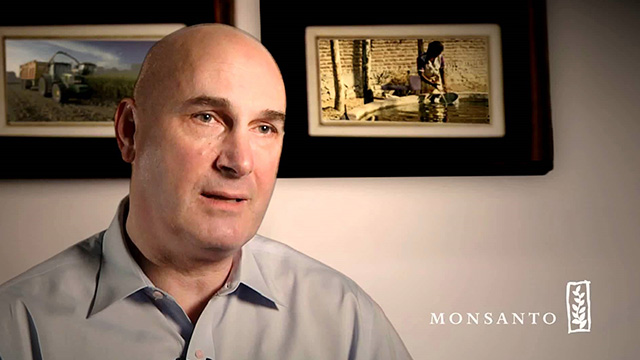Monsanto CEO Hugh Grant insists Roundup is safe, adamantly denies cancer link
Wednesday, April 20, 2016 by: Julie Wilson staff writer
Tags: Monsanto CEO Hugh Grant, cancer, glyphosate

(NaturalNews) Despite mounting evidence that the world's most widely used weedkiller is linked to a host of chronic illnesses, including cancer, Monsanto has no intention of suspending its use. In a March interview with Here & Now's Robin Young and Jeremy Hobson, Monsanto CEO Hugh Grant maintains the safety of Roundup, despite the World Health Organization's declaration that the weedkiller is "probably carcinogenic."
"Roundup is not a carcinogen. It's 40 years old, it's been studied; virtually every year of its life it's been under a review somewhere in the world by regulatory authorities," Grant told Hobson.
"So Canada and Europe just finished. Europe finished their review last year and came back with glowing colors. The Canadians were the same and now we are going through a similar process in the U.S., so I've absolutely no concerns about the safety of the product."
An ineffective approval process
But as most of us have come to learn, just because something was approved for market use, doesn't make it safe. In fact, countless chemical products have been discontinued only after they wreaked havoc on people's health; the very same chemical-laden products that were approved or reviewed by "regulatory authorities."Monsanto is no stranger to this kind of double-dealing.
Prior to entering the seed business, Monsanto produced polychlorinated biphenyls, commonly known as PCBs, from 1935 to 1979. The toxic compounds were used to insulate electronics before being outlawed by the U.S. Environmental Protection Agency due to human health and environmental concerns.
Internal memos prove the seed giant knew about the toxicity of PCBs as far back as 1970 but continued production, focusing only on profit revenue; Monsanto earned $10 million off the pollutants, which are now realized to have contaminated waterways all over the world.
The toxicants, linked to cancer and adverse effects on the human immune, nervous, reproductive and endocrine systems, are known to damage aquatic organisms and wildlife, as well as humans.
Monsanto sued over PCB contamination
The result is a string of lawsuits filed against Monsanto by multiple cities in America's West. Seattle, Spokane, San Diego, San Jose,and Oakland have sued the seed giant over PCB contamination.Monsanto denies all responsibility, blaming those who "mishandled" the chemicals. In the interview, Grant blamed the "former Monsanto," arguing that the company was under different ownership during its PCB production. Grant also refutes the purported health effects of PCBs.
"We've been working with these cities for decades now in part of that cleanup, but we are not wholly responsible for that. There's other people in that chain that are responsible."
Glyphosate under scrutiny
It's probable that Monsanto will face similar legal consequences as result of its glyphosate use, the primary (and demonstrably tumorigenic) ingredient in Roundup. We just haven't quite gotten there yet. But the good news is that regulatory agencies around the world are increasingly placing glyphosate under the microscope.The European Parliament (EP) came close to letting its glyphosate license expire due to pressure from environmental activists. Though the weedkiller license was recently renewed by European officials, new restrictions have been applied.
The EP approved glyphosate use for another seven years, rather than the 15 that was originally requested. Officials recommended its use be limited to professionals only and advised that the weedkiller not be applied to public playgrounds and parks. The recommendations are just that, however.
While the recommendations are weak and totally ineffective for protecting public health and the environment, they are still a step in the right direction. Governmental discussions about glyphosate cannot be had without immense opposition and health concerns – a form of progress nonexistent just a few years ago.
Sources:
HereAndNow.WBUR.org
RT.com
EcoWatch.com
Science.NaturalNews.com
Monsanto CEO Hugh Grant at FETCH.news
Get independent news alerts on natural cures, food lab tests, cannabis medicine, science, robotics, drones, privacy and more.
Take Action: Support Natural News by linking to this article from your website
Permalink to this article:
Embed article link: (copy HTML code below):
Reprinting this article:
Non-commercial use OK, cite NaturalNews.com with clickable link.
Follow Natural News on Facebook, Twitter, Google Plus, and Pinterest
- Newly released JFK files reveal Pentagon's role in creating Lyme disease and covid in the same lab
- Analysis: The coming economic collapse, a mass uprising and Trump's three secret weapons to halt the growing revolt
- BIGGEST SCAM: You pay income tax, then taxes on purchases, then personal property tax on what you own that you already paid taxes on with taxed money
- American food is the MOST TOXIC “FOOD” on earth
- EXPOSED: Antifa and IRS collude to shield radical funding from taxation
- The flu vaccine paradox: Are we making things worse?
- A lack of integrity in Academia: Harvard professor found GUILTY of fraudulent research to promote CRT theory
- Big Pharma's $8 Billion bribery scheme exposed: how doctors are pushed to prescribe junk science, not heal
- Reclaim your health: How midlife exercise reverses years of inactivity
- Heads up! List of food shortages expected in 2025 as the campaign of forced starvation continues to be waged against the American people
- Trump reverses course on Gaza plan, says “nobody is expelling Palestinians”
- Florida takes a stand: DeSantis proposes permanent ban on mRNA vaccine mandates
- OpenAI whistleblower who dissented against how the company trained ChatGPT found dead
- Elon Musk: Aliens could be here on Earth RIGHT NOW
- Mike Adams Sermon 66: God will DESTROY ISRAEL for its wickedness
- Beyond consequence
- Discovery of Texas GOP representative living in retirement home amid health challenges and congressional absence sparks uproar
- Dr. Mike Yeadon releases 15-minute testimony - WATCH - about genocidal intent of COVID “vaccines”
- Reclaim your health: How midlife exercise reverses years of inactivity
- A lack of integrity in Academia: Harvard professor found GUILTY of fraudulent research to promote CRT theory
- Space war brewing? Russia threatens to destroy Starlink satellites
- EPA advisor admits the agency is funneling billions to climate groups ahead of Trump’s return to White House
- Elon Musk: Aliens could be here on Earth RIGHT NOW
- Big Pharma's $8 Billion bribery scheme exposed: how doctors are pushed to prescribe junk science, not heal
- Historian warns Israel may be entering an “IRREMEDIABLE DECLINE”
- Trump reverses course on Gaza plan, says “nobody is expelling Palestinians”
- Mike Adams Sermon 66: God will DESTROY ISRAEL for its wickedness
- Rep. Nancy Mace introduces bill to ban biological males from female facilities on federal property
- New York politicians push bill allowing governor to indefinitely detain the unvaccinated on a whim
- RFK Jr.'s SSRI antidepressant investigation sparks liberal meltdown, exposes Big Pharma's dangerous game
- 5 Simple steps to boost your brainpower: How to strengthen executive function in a distracted world
- Mark Zuckerberg's REAL NAME is Jacob Greenberg and he is the GRANDSON of DAVID ROCKEFELLER, hence the POWER of FAKEBOOK
- Survival 101: Effective EMF blocking techniques
- Sales of survival bunkers rise following Russia’s use of the Oreshnik hypersonic ballistic missile
- Trump Administration cuts 2,000 USAID jobs, places most employees on leave in sweeping reform effort
- Pilots report mysterious lights 'moving at extreme speeds' across Oregon skies
- EPA advisor admits the agency is funneling billions to climate groups ahead of Trump’s return to White House
- The Health Ranger releases “Vaccine Zombie” song and music video, using AI-animated zombies for the music video
- The pandemic as a tool for INDOCTRINATION: Understanding “The Indoctrinated Brain” by Dr. Michael Nehls
- California's social media censorship law struck down: A victory for free speech or a threat to online safety?
- Mike Adams releases new song and music video: Nothing More Disgusting Than a Globalist
- Congratulations to the FULLY UNVACCINATED as you resisted the COVID-19 PROPAGANDA MACHINE fueled by over $100 BILLION
- Mike Adams releases country western hit single: Goin’ Back in Time is Comin’ Home
- Dr. Mike Yeadon releases 15-minute testimony - WATCH - about genocidal intent of COVID “vaccines”
- RFK Jr. clears key hurdle: Sen. Susan Collins backs controversial HHS nominee, signaling a new era for health policy
- Mike Adams releases music poetry sensation: A Child of God
- Unpacking the Lies That We’ve Been Fed – new song and music video released by Mike Adams, the Health Ranger
- Trump administration takes on global censorship: A new frontier for free speech advocacy
- Ex-FBI Chief EXPOSES disgraceful government coverups of Oklahoma City Bombing, Kennedy assassinations, 9/11 WTC, and "Terrorism" as plot to destroy Constitution
- Federal judge backs Trump's mass firings, clearing path for government downsizing
- Florida takes a stand: DeSantis proposes permanent ban on mRNA vaccine mandates
- Michigan sheriff announces criminal investigation into 2020 election crimes, Dominion Voting Systems
- “Why we influenced the 2020 elections”: Facebook files reveal the coordinated effort to bury the Hunter Biden laptop story
- Bush tomato: A mighty superfood that supports digestive health
- Red Cross issues warning to stop blood plasma donations from vaccinated people
- Scientists confirm: GENIUS brain function can be spontaneously unleashed in humans without any apparent cause
- EPA advisor admits the agency is funneling billions to climate groups ahead of Trump’s return to White House
- HYSSOP: What research reveals about the health benefits of this ancient holy herb
- Two containers with completed ballots fall out of truck in Florida
- Fully vaccinated about to see “tsunami” of illness and death, warns virologist
- Today I asked our AI language model “Neo” about which phytonutrients or phytochemicals can block the spike protein related to SARS-CoV-2 … Here is what it answered…
- Global leaders unite to clamp down on “misinformation” with UN-backed Cascais Declaration
- BREAKING: 2025 NDAA authorizes mandatory military draft of WOMEN across America… as Pentagon pursues global NUCLEAR war with both Russia and China at the same time
- Michael Yon warns of a ZIONIST TAKEOVER in Trump’s second administration
- BOMBSHELL: DNA testing kits are a SCAM to develop ethnic-specific bioweapons
- Ozempic and Wegovy weight loss drugs are injectable LIZARD VENOM PEPTIDES that may unleash a devastating wave of organ failure… side effects align with symptoms of SNAKE BITES
- Israeli soldiers accused of even more torture and abuse in the West Bank
- These 13 countries just signed an agreement to engineer a global FAMINE by destroying food supply
- NASA admits that climate change occurs because of changes in Earth’s solar orbit, and NOT because of SUVs and fossil fuels
- RFK Jr. clears key hurdle: Sen. Susan Collins backs controversial HHS nominee, signaling a new era for health policy
- Sermon 30: How Jesus reveals Caesar’s FAKE CURRENCY and FALSE AUTHORITY
- Coriander seeds: Ancient medicine backed by modern science
Science News & Studies
Medicine News and Information
Food News & Studies
Health News & Studies
Herbs News & Information
Pollution News & Studies
Cancer News & Studies
Climate News & Studies
Survival News & Information
Gear News & Information
News covering technology, stocks, hackers, and more



"Big Tech and mainstream media are constantly trying to silence the independent voices that dare to bring you the truth about toxic food ingredients, dangerous medications and the failed, fraudulent science of the profit-driven medical establishment.
Email is one of the best ways to make sure you stay informed, without the censorship of the tech giants (Google, Apple, Facebook, Twitter, YouTube, etc.). Stay informed and you'll even likely learn information that may help save your own life."
–The Health Ranger, Mike Adams












































